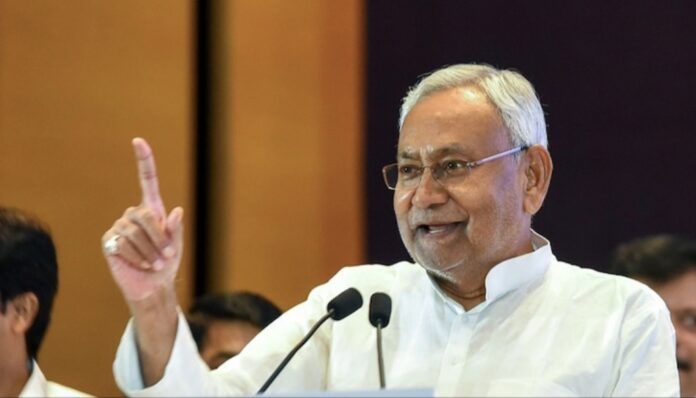Ahead of this year’s Assembly elections, Bihar revives commissions apparently
to balance alliances, and not empower communities.
NEW DELHI: In the run-up to the Bihar Assembly elections scheduled for October–November 2025, the Nitish Kumar-led NDA government has revived 10 state-level commissions, covering nearly every politically relevant segment — from Scheduled Castes and Scheduled Tribes to minorities, upper castes, Mahadalits, madrasa educators, food security, fishermen, and price regulation.
While officially projected as inclusive and welfareoriented, the structure and composition of these bodies point to a calculated political exercise aimed at rewarding loyalists, managing caste equations, and accommodating relatives of alliance leaders. The Scheduled Caste Commission is emblematic of this trend. Dubbed by critics as the “Damaad Aayog” (Son-in-law Commission), its chairman, Mrinal Paswan, is the son-in-law of the late Ram Vilas Paswan and brother-in-law of LJP (RV) leader Chirag Paswan.
The vice-chairman, Devendra Kumar, is the son-in-law of former CM Jitan Ram Manjhi. Both appointments, critics argue, serve alliance balancing rather than community empowerment. The nickname reflects growing public cynicism over how key posts are increasingly handed out to relatives of influential politicians, often prioritising family and political loyalty over merit or grassroots engagement.
The Scheduled Tribe Commission, the Minority Commission, and the Mahadalit Commission have followed similar lines. Shailendra Kumar has been named chairman of the ST Commission, while the Minority Commission is now headed by JDU’s Ghulam Rasool. The Mahadalit Commission is chaired by JDU leader Manoj Kumar, son of its founding chairman Vishwanath Rishi. The Bihar State Commission for Development of Upper Castes has also been restructured, with BJP’s Mahachandra Singh as chairman and JDU’s Rajeev Ranjan Prasad — a national spokesperson for the party — appointed vice-chairman. Prasad, who has no prior record of engagement in policy or caste reform, is seen by observers as part of a mutual accommodation strategy between the BJP and JDU ahead of the polls.
The State Food Commission, Price Monitoring Commission, Machhua (Fisherfolk) Commission, and the Madrasa Education Board reflect the same trend: appointees drawn not from expert, academic, or grassroots activism backgrounds, but from political party rosters, electoral families, or loyal alliance affiliates. BJP, JDU, RLSP, and LJP(RV) have all secured representation in one or more commissions through politically placed names.
Also on the list is the Bihar State Women’s Commission, reconstituted in June after being defunct for over 15 months. With more than 6,000 pending cases at the time of revival, the commission was handed to Professor Apsara as chairperson, along with six other appointed members. While the reactivation has been presented as a response to institutional backlog, it follows the same pattern — prioritising political placement over demonstrated leadership in women’s rights or justice delivery.
What further weakens these commissions is the absence of appointees with credible track records of work, research, or leadership within the communities they are meant to represent. The selections reflect political loyalty over domain expertise, and symbolism over substance. As a result, bureaucracy offers minimal cooperation to these bodies. Officials, knowing that most chairpersons and members lack statutory power or subject matter expertise, routinely ignore their recommendations.
Reports are delayed or unread, field visits are symbolic, and the commissions themselves become sidelined — even in matters they are constitutionally allowed to advise on. Nonetheless, the perks that come with these appointments are substantial: official accommodation, travel budgets, gunmen in uniform, staff support, and in some cases, vehicles with red beacons — all paid from the public exchequer. Though many such appointees regularly pay lip service to Jayaprakash Narayan — a leader who shunned privilege and display — they, in reality, embrace positions defined by perks and optics, often to compensate for their absence from electoral relevance.
The cumulative outcome is the emergence of a politically convenient but administratively irrelevant parallel structure, where real marginal voices remain excluded while familiar names and families are rotated into high-sounding but hollow offices. While commissions were originally intended as instruments of empowerment, they now function as placatory extensions of coalition politics. With elections just months away, their reactivation appears designed to signal inclusion while delivering little actual representation or reform.
The contrasting neglect of the Bihar Lokayukta only underscores this politicised approach. At one point in 2024, all three statutory posts — Chairperson, Judicial Member, and NonJudicial Member — were simultaneously vacant, with nearly 12,000 complaints left unaddressed. Although a new chairperson, Justice Sanjay Kumar Singh, was appointed in July 2024, the two member positions remain unfilled to date.
The prolonged vacancy, despite a High Court directive to complete appointments by December 2023, suggests that bodies without electoral or caste arithmetic utility — and those that might scrutinise power rather than consolidate it — are simply allowed to decay. In contrast to the flurry of activity surrounding politically convenient commissions, the Lokayukta remains a shell — functional only in name and structurally weakened by design.








